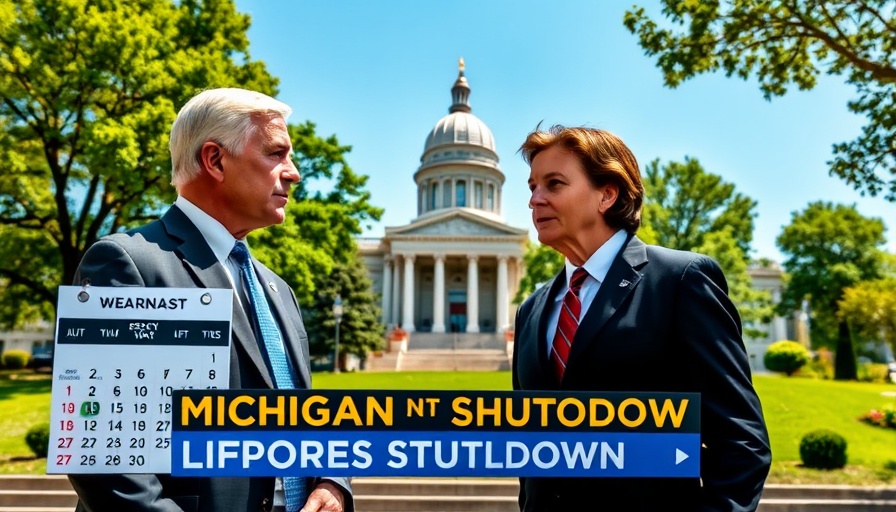
Understanding Trump's Executive Order on Cashless Bail
In a bold move that aims to reshape America's bail system, President Trump has issued an executive order targeting the controversial practice of cashless bail. Supporters claim that cashless bail perpetuates poverty by unfairly penalizing low-income individuals who cannot afford to post bail, while the President argues it enables repeat offenders to roam the streets freely, jeopardizing public safety. This shift marks a pivotal moment in the dialogue surrounding criminal justice reform and the broader implications for communities across America.
In President Trump issues executive order to end cashless bail, the discussion dives into the implications of this new directive, prompting a deeper analysis of its effects on Michigan's justice system.
What is Cashless Bail and Why Does It Matter?
Cashless bail, or “zero bail,” allows individuals accused of minor, non-violent offenses to be released without monetary payment, based primarily on self-recognition. Critics argue that while it seeks to destigmatize poverty, it may inadvertently hearten those with criminal intent to commit more offenses, knowing they won’t be held financially accountable. Areas like Illinois, New Mexico, and New Jersey have implemented versions of this system, facing heated debates regarding its effectiveness and morality in promoting public safety.
The Arguments: Public Safety vs. Penalizing Poverty
Central to this discussion are arguments about public safety. Proponents of cashless bail frequently underscore its role in reducing the financial strain on low-income offenders. They advocate for a justice system that evaluates individuals based on their actions rather than their economic status. Meanwhile, President Trump and his supporters maintain that without the deterrent of a financial bond, repeat offenders face no repercussions, which may lead to increased crime rates.
Repercussions of the Executive Order
The executive order indicates that federal funds will be withheld from states and local governments that continue to practice cashless bail—an essential part of the national strategy to combat crime. This directive raises questions about the balance of federal power over state judicial systems and the implications for those states that might resist this mandate. Could it propagate discrepancies in public safety approaches across the nation and strain local resources?
Impacts on Local Governments and Communities
For places like Detroit and surrounding Metro areas, the ramifications of this order could be profound. As residents absorb this new directive from federal authorities, discussions surrounding local governance and law enforcement strategies will intensify. Leaders in Michigan may find themselves in contentious debates about appropriating resources to adhere to federal mandates while simultaneously addressing local public safety concerns.
The Broader Context: National Crime Rates and Community Impact
As crime rates across the country fluctuate, questions about the relationship between bail practices and public safety resurface. Despite various jurisdictions operationalizing cashless bail, reports suggest a nationwide crime decline, leading some to question if the cashless model has in fact led to safer streets or if there are underlying factors affecting crime statistics.
Partisan Perspectives: Views from Across the Aisle
Discussion around cashless bail is often tinged with partisanship. Democrats tend to frame cashless bail as an avenue for equity, whereas Republicans position it as a detriment to public order. The diverging perspectives underscore broader societal challenges and reveal a need for compromise, impactful discussions, and shared visions for a safe future.
Looking Ahead: Future Implications for Bail Reform
In light of recent directives, future reforms associated with bail practices could significantly reshape the justice landscape. Advocates urge a deeper exploration of their definitions, with key stakeholders striving to find solutions that adequately address poverty while maintaining public safety. There remains a crucial need for legislative actions that align local and federal institutions in their fight against crime.
Conclusion: A Call for Balanced Perspectives
As Michigan residents navigate this evolving dialogue surrounding cashless bail, it’s vital to remain informed. Public discussions, whether through community events, forums, or local news, are critical in shaping perceptions and policy. Understanding the intricacies of these issues is paramount, as they directly affect everyday life in cities like Detroit. We encourage you to stay engaged with local news and participate in conversations that can drive change.
 Add Row
Add Row  Add
Add 



Write A Comment